Nigeria’s June 2024 Inflation Rate Rises to 34.19% as Monetary Policy Measures Prove Muted

“…hunger no longer walks with threadbare clothes…it walks naked” – Analysts
This commentary considers:
- Key Highlights from the June 2024 Inflation Report
- Inflation in H1 2024
- Inflation Across Regions
- Inflation in Nigerian States
- Analysts Thoughts and Policy Recommendations
Nigeria’s consumer price index (CPI) continues to suggest rising domestic prices and a collapse of consumers’ and households’ real disposable incomes. With food inflation scaling over 40% year-on-year (Y-o-Y), analysts are caught wondering why the Central Bank of Nigeria (CBN) ‘s tightening of the money supply and raising interest rates have not tuned down local inflation.
Nigeria’s inflation rate has risen for the 18th consecutive time since January 2023. Data released by the National Bureau of Statistics (NBS) on Monday, July 15, 2024, showed that Nigeria’s headline inflation rate rose to 34.19% in June 2024 from 33.95% in May and 22.79% in June 2023.
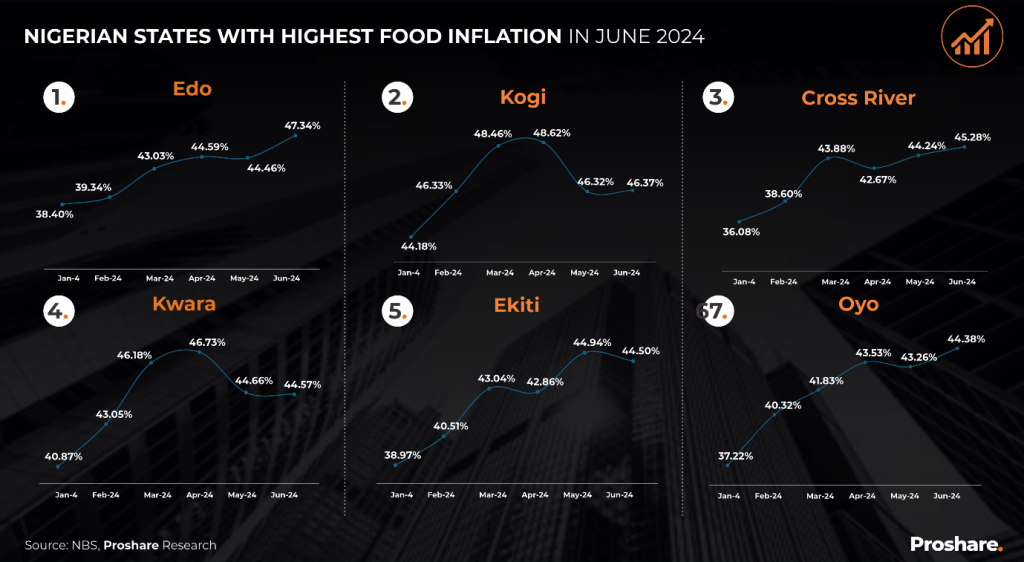
Key Highlights
- Headline inflation rose by 11.40% points Year-on-Year (Y-o-Y), to 34.19% in June 2024 from 22.79% recorded in June 2023.
- The three-month decline in headline Inflation halted in June, rising by 2.31%.
- Core inflation rose Y-o-Y from 20.06% in June 2023 to 27.40% in June 2024.
- Inflation remained higher in urban areas, at 36.55% in June 2024, from 24.33% in June 2023, then in rural areas, at 32.09% in June 2024, from 21.37% in June 2023.
- Food inflation rose by 15.62% points to 40.87% in June 2024 from 25.25% recorded in June 2023.
- Bauchi state emerges as the highest headline inflation state while Bornu remained at the top of states with the overall lowest inflation in June 2024.
- Edo emerged as the state with the highest food inflation, while Nasarawa is the top state with the lowest food prices. (see Chart 1 below).
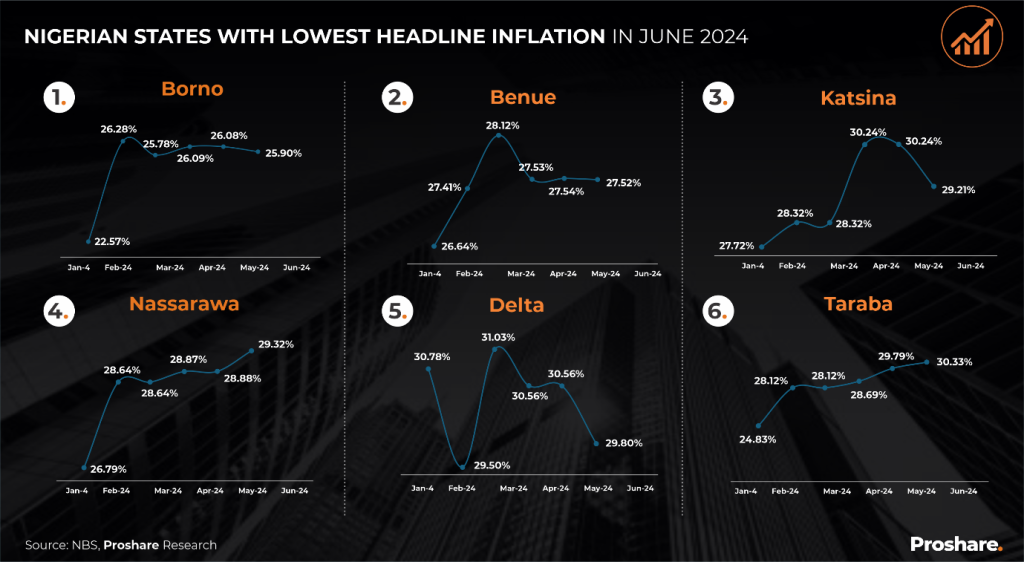
In April 2024 and May 2024 inflation commentaries, Proshare analysts raised concerns about the drivers of the month-on-month (M-o-M) inflation moderations. No clear policy insights were provided to justify the monthly moderation in inflation rates. Analysts projected a reversal in the monthly moderation, which set in in June 2024 (see chart 2 below).
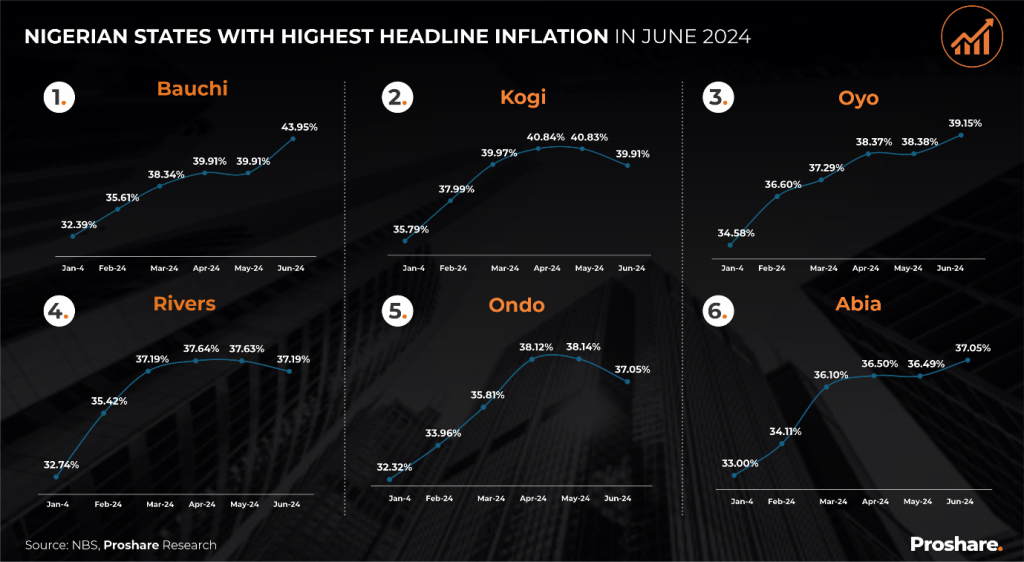
Inflation Figures in H1 2024
- Inflation averaged 32.77% in H1 2024 from 22.47% in 2023.
- Core inflation averaged 25.98% in H1 2024 from 19.6% in H1 2023.
- Food inflation averaged 39.24% in H1 2024 from 24.94% in H1 2023.
- Real interest rate averaged -10.02% in H1 2024 from -4.36% in H1 2023. (see chart 3 below).
Chart 3:
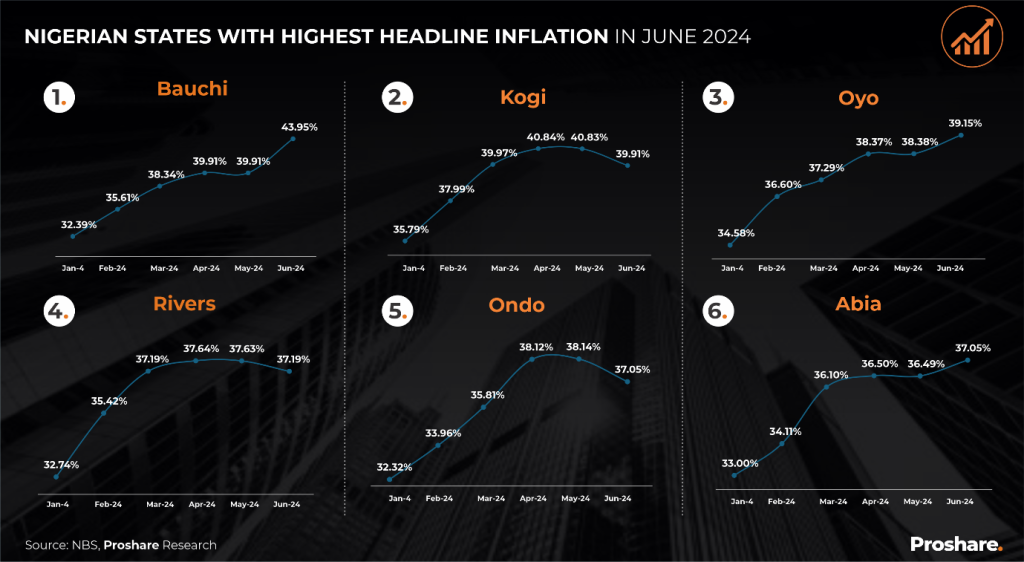
Inflation Across Regions in Nigeria
For the third consecutive month, the Southwest remained the region with the highest headline inflation since overtaking the South-South in May 2024. States driving inflation in the Southwest include Oyo, Ekiti, and Lagos, with respective inflation growth rates of 36.18%, 34.11%, and 36.37% in June 2024 (see chart 4 below).
Chart 4:
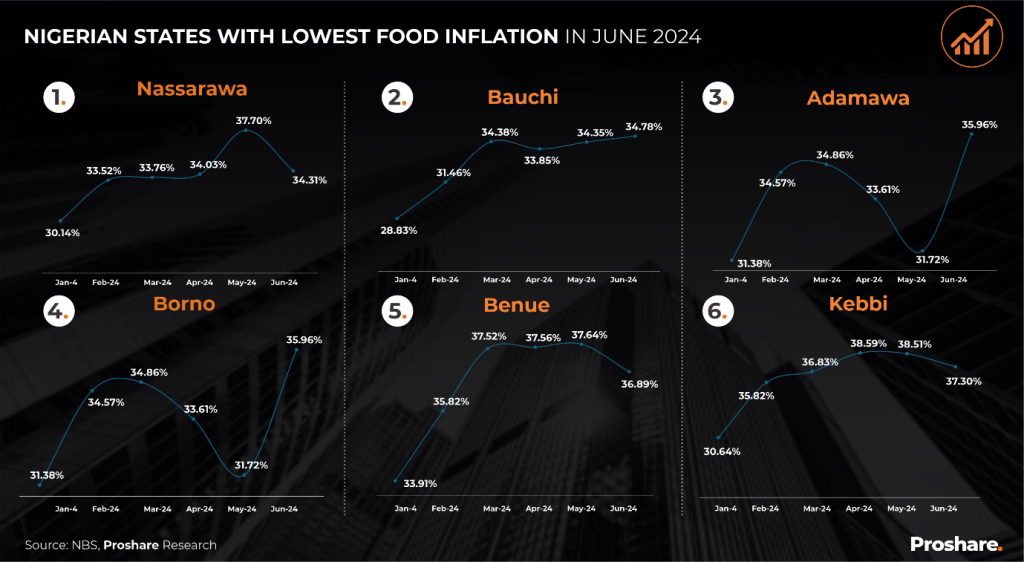
The South-South remained the region with the most expensive food prices, with states such as Edo, Rivers, and Cross Rivers having the highest food prices in the south-south. The Northeast, a major source of cereals and livestock, stood as the region with the lowest food prices despite having an average food inflation of 38.06% in June 2024 (see chart 5 below).
Chart 5:
Inflation in Nigerian States
Headline Inflation in Nigerian States: What is happening in Bauchi?
Despite ranking as the second-lowest food inflation state at 34.78%, Bauchi had the highest headline inflation in June 2024. This underpins the dire food crisis in the state, which now topples Kogi as the state with the highest consumer prices. Kogi had previously topped the list as the highest inflation state since the beginning of 2024 (see chart 6 below).
chart 6:
Bornu State maintained its position as the state with the lowest headline inflation since the beginning of 2024 despite the volatility of the security crisis. We believe the influx of humanitarian aid to the state has been a cushion (see chart 7 below).
Chart 7:
Food Inflation in Nigerian States: Edo Relegates Kogi
After five months at the helm of rankings, Kogi dropped to the second state with the highest food inflation in Nigeria in June 2024, overtaken by Edo (see chart 8 below).
Chart 8:
Nasarawa, Bauchi, and Borno states had the lowest food prices in June 2024 (see chart 9 below).
Chart 9:
Closing Thoughts
A recast of policy options from the Proshare economic conference on February 23rd, 2024, reveals realities and policy directions to be considered as proposed by economists and industry experts in Nigeria . (see illustration 1 below).
On the implications of the June 2024 inflation figure for the economy, financial markets, and policy directions going forward ,analysts’ opinions on the right combination of policies needed to address rising inflation rates ranged from exchange rate appreciation and stability to increasing the stock of foreign exchange reserves by the financialization of idle public assets.
Analysts Say on the Economy
Dr. Ayo Teriba, the CEO of Economic Associates, noted that inflation was decelerating but made a strong case for efforts to tame it through stability in the foreign exchange market and strengthening of the country’s reserves.
He asserted that the pathway to addressing the rising tide of inflation in the country was to boost inflows into the foreign exchange. This would impact issues like the cost of foodstuffs and the ongoing debate over the national minimum wage.
Dr. Tilewa Adebajo, the CEO of CFG Advisory, said, “What is happening now is that the cost-push factors are still seeing their way through the economy. Also, the money supply levels have reached 100 trillion Naira, a source of concern, as is the moderate increase in core inflation. On the positive side, the inflation acceleration rate has come down. The key challenge remains food inflation.”
Proshare Analysts note that Nigeria’s June 2024 headline inflation figure rose 34.19%, slightly higher than the in-house projection of 34.17%. The figure, as reflected in our April 2024 inflation commentary, was that the M-o-M decline in headline rate and food and core inflation was temporary and unsustainable. “Notably, nothing has improved in curbing rising prices in the economy, and as such, policies so far have had a neutral effect in stopping inflation. It tells us that the real issue driving inflation remains multi-faceted, beyond the mere use of interest rate monetary mechanism.”
Financial Market
Mr. David Adonri, a stockbroker with Highcap Securities, said that despite all the measures taken by the Central Bank of Nigeria, the inflation rate continues to rise. “The continued application of monetary policy to tackle this kind of stubborn inflation is failing because demand management is not required but supply-side fiscal policy. Should the monetary authority react by hiking interest rates again, it will further increase the yield on debt and cause financial assets to migrate more to debt. This may harm the ongoing recapitalisation exercise of banks. Rising inflation is not good news to equities.”
The MD of MBC Securities, Mr Olutoyin Ayoade, observed in his discussion that the persistent rise in inflation has significantly eroded real returns on investments. As of July 15th, 2024, the return on equity stood at 33.70%, while the inflation rate for June stood at 34.19%. The disparity increased the real loss margin for investors. Money market instruments provided a return of 21.24%, and fixed-income instruments offered a return of 20%. He added, “The inflation rate exceeding the returns on these investments further diminishes their real value, underscoring the challenge investors face in preserving their purchasing power in a high-inflation environment. Inflation generally reduces the purchasing power of consumers or investors. We expect mixed sentiment in the market as investors are likely to invest and ensure they beat inflation. We also expect reduced activity in the capital markets due to persistent inflationary environment, which does not encourage investment.”
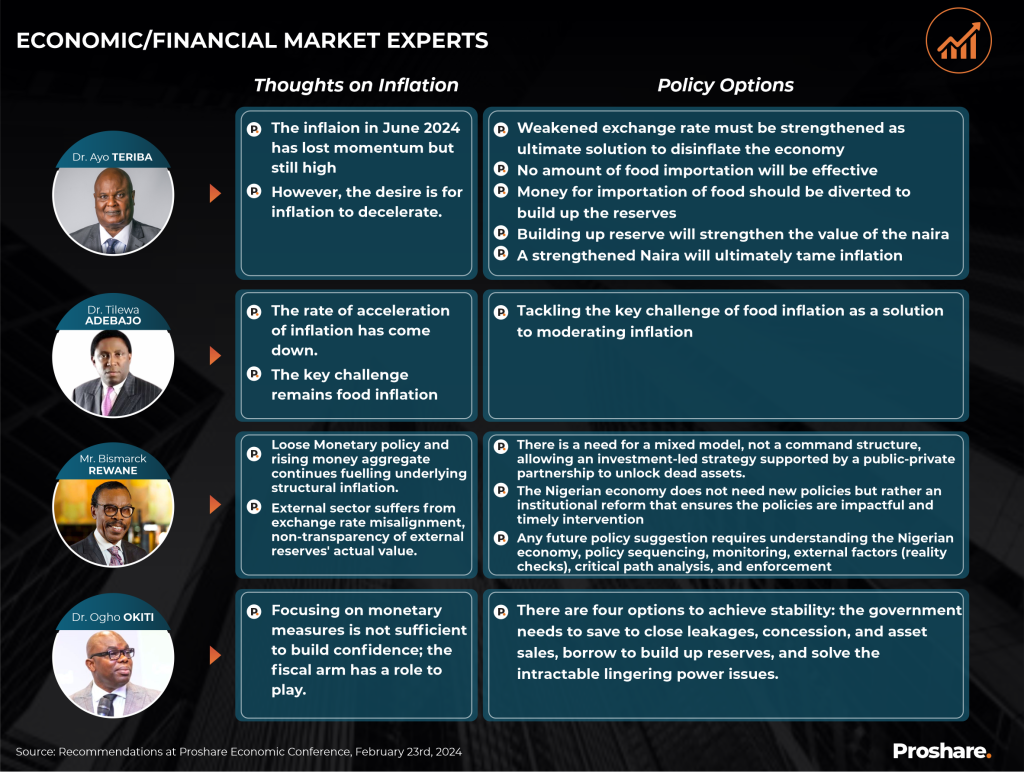
Mr. Seyi Akinbi, an investment analyst, said that the recent inflation print would continue to exert upward pressure on fixed-income yields for the next few months as the CBN is expected to remain hawkish in the short to medium term. “Yields are expected to climb 50-100bps points in the interim as traders wager on incentives to buy Fixed income securities in this current high inflationary cycle.”




